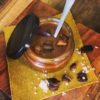No products in the cart.
Return To Shop
© Fine Food Merchants (Pty) Ltd 2020/255020/07
Menu



R59.00
Kefir (correctly pronounced kuh-fear) with live probiotic cultures is a ‘health bomb in a bottle’! Kefir is a yoghurt-like, fermented drink that originated in Eastern Europe and has been consumed for thousands of years.
It is a cultured enzyme and probiotic-rich food which enhances the colonization of healthy bacteria in your digestive tract, amongst other things.
500ml
Please allow a delivery delay of up to 10-20 days
The fermentation process causes it to have a tangy taste with a bit of a ‘fizz’ , hence the nickname ‘Dairy Champagne’.
Because of the proliferation of so many healthy probiotics, it will not ‘go off’ per say, but will become VERY tangy and fizzy if you leave it too long and the lid may pop because of the CO2 produced during the fermentation process.
Kefir is drunk, sipped or added to smoothies and other foods for many reasons by people looking to take advantage of its many health benefits.
There are a multitude of health benefits of kefir which have been proven through numerous research projects and studies around the world. Some of these benefits are:
IMPROVEMENT OF DIGESTIVE HEALTH
Because Kefir contains a wide variety of probiotics, which are known to be beneficial to maintaining and restoring the balance of intestinal microflora, it helps with problems such as constipation, diarrhea, bloating and gastritis
Studies have shown that the probiotic Lactobacillus kefiri, which is unique to Kefir can inhibit the growth of various harmful bacteria, including Salmonella, E. Coli and ulcers caused by Heliobacter Pylori infection and fights IBS (irritable bowel syndrome).
Kefir is also known to alleviate and help fight reflux and bile production.
Kefiran which is a type of carbohydrate found in Kefir, also has antibacterial properties.
IMPROVES BONE HEALTH & LOWERS RISK OF OSTEOPOROSIS
Ensuring adequate calcium intake is one of the most effective ways to improve bone health and slow the progression of osteoporosis. Because our Kefir is made from cows milk it is a great source of calcium.
Kefir made from full-fat dairy is not only a great source of calcium, but also Vitamin K2. This nutrient plays a central role in calcium metabolism and supplementing with it has been shown to reduce fractures by as much as 80%.
In certain studies it has been shown to assist with other musculo-skeletal disorders such as arthritis and gout.
BETTER TOLERATED BY LACTOSE INTOLERANT PEOPLE
For the lactose intolerant, Kefirs abundance of beneficial yeasts and various bacteria provide lactase which is an enzyme that consumes most of the lactose after the fermentation process.
The bacteria in Kefir turn the lactose into lactic acid lowering the amount of lactose in Kefir compared to milk. This is the reason why lactose intolerant people are able to tolerate Kefir better than milk.
| Weight | 0.5 kg |
|---|---|
| Choose size | 500ml, 2L |
R120.00


R100.00